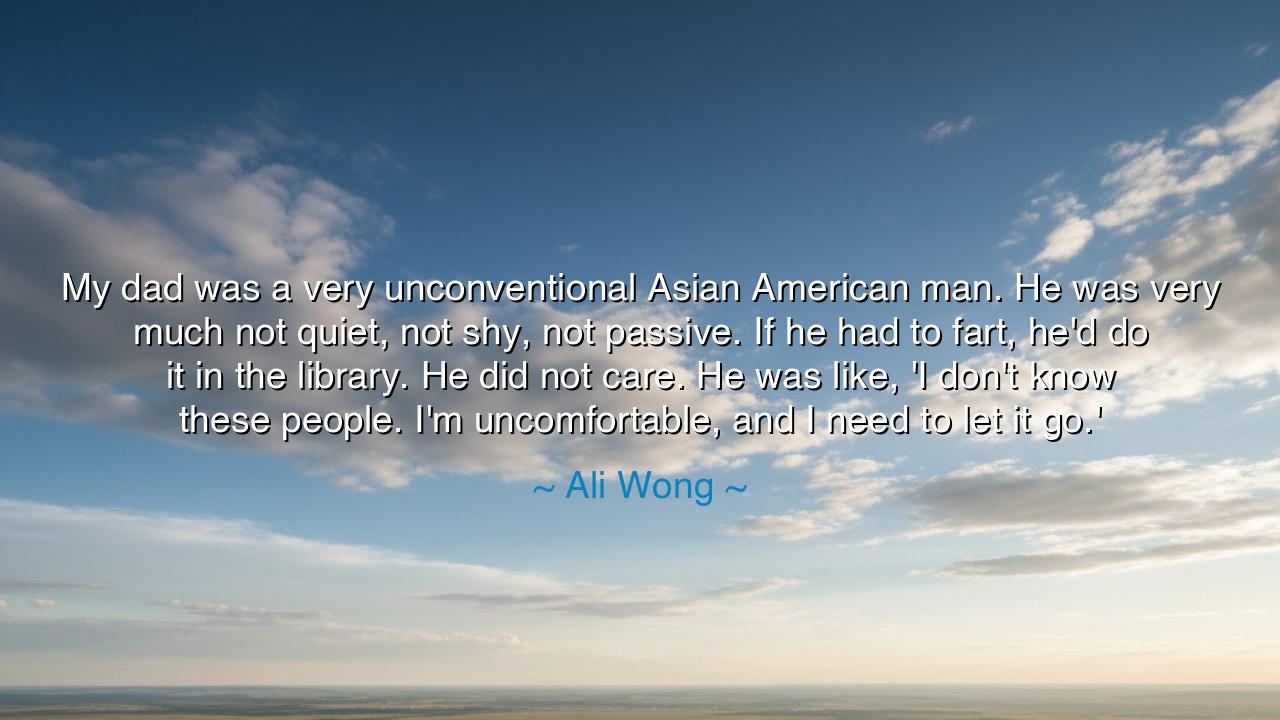
My dad was a very unconventional Asian American man. He was very
My dad was a very unconventional Asian American man. He was very much not quiet, not shy, not passive. If he had to fart, he'd do it in the library. He did not care. He was like, 'I don't know these people. I'm uncomfortable, and I need to let it go.'






Hearken, O children of courage and authenticity, and attend to the words of Ali Wong: “My dad was a very unconventional Asian American man. He was very much not quiet, not shy, not passive. If he had to fart, he'd do it in the library. He did not care. He was like, 'I don't know these people. I'm uncomfortable, and I need to let it go.'” In these words lies a meditation upon individuality, courage, and the embrace of one’s true nature. From the earliest ages, the wise have observed that conformity, while comforting, often binds the spirit. Wong’s father embodies a profound lesson: to live fully, one must honor the self, even in the face of decorum, expectation, and scrutiny.
Consider the nature of unconventional courage. To act without fear of judgment is not mere recklessness, but a declaration of authenticity. Wong’s father, unshaken by the gaze of strangers, expressed the truth of his needs openly, refusing to bow to silence or shame. In doing so, he teaches a timeless virtue: that integrity and self-respect sometimes demand the breaking of social expectation, and that comfort with one’s own being is a path to freedom.
History offers luminous parallels. Diogenes, the philosopher of old, wandered the streets of Athens, unashamed of his eccentricities, living simply and rejecting pretense. He demonstrated through behavior that authenticity and truth were more noble than conformity and fear of judgment. Like Wong’s father, Diogenes revealed the power of living according to one’s own principles, even when those principles challenged the norms of society.
Wong’s reflection also illuminates the importance of self-care and emotional honesty. To express discomfort, to release tension, to honor physical and emotional needs—even in public—is a radical acknowledgment of humanity. Her father’s actions, though humorous and unconventional, reveal a deeper truth: that neglecting one’s own needs for the comfort of others may erode the spirit. To act authentically is to respect the self while navigating the world.
The tale further emphasizes the lesson of fearlessness in small acts. Courage is often demonstrated not only in great deeds but in the ordinary, the daily, the moments that test social norms. By acting without shame in situations that others might fear, one cultivates resilience, self-confidence, and freedom from the tyranny of opinion. Wong’s father, in a simple act of honesty, models how to live boldly, embracing life’s necessities with dignity and humor.
From this teaching flows practical wisdom. Observe and honor your own needs, even when society imposes restraint. Speak, act, and move with authenticity, balancing respect for others with fidelity to your own nature. Recognize that fear of judgment is a constraint upon the spirit, and that true liberation comes from courageously embodying one’s principles and inclinations.
Let the generations remember this eternal truth: authenticity is a form of power. Ali Wong’s words remind us that conformity, though safe, is not always virtuous. Her father’s fearless approach to life, humorous and unorthodox, demonstrates that strength lies in embracing one’s true self, acting in alignment with one’s nature, and refusing to be enslaved by the expectations of strangers.
Therefore, O seeker of courage, walk your path with honesty and humor. Honor your instincts, express your truth, and embrace the freedom that comes from authenticity. In doing so, you cultivate a spirit unbound by fear, a life luminous with individuality, and a legacy that teaches others the power of being unapologetically oneself, even in the quietest libraries of the world.






AAdministratorAdministrator
Welcome, honored guests. Please leave a comment, we will respond soon